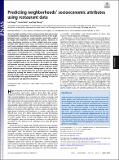| dc.contributor.author | Dong, Lei | |
| dc.contributor.author | Ratti, Carlo | |
| dc.contributor.author | Zheng, Siqi | |
| dc.date.accessioned | 2020-03-26T19:18:39Z | |
| dc.date.available | 2020-03-26T19:18:39Z | |
| dc.date.issued | 2019-07-15 | |
| dc.identifier.issn | 0027-8424 | |
| dc.identifier.issn | 1091-6490 | |
| dc.identifier.uri | https://hdl.handle.net/1721.1/124367 | |
| dc.description.abstract | Accessing high-resolution, timely socioeconomic data such as data on population, employment, and enterprise activity at the neighborhood level is critical for social scientists and policy makers to design and implement location-based policies. However, in many developing countries or cities, reliable local-scale socioeconomic data remain scarce. Here, we show an easily accessible and timely updated location attribute—restaurant—can be used to accurately predict a range of socioeconomic attributes of urban neighborhoods. We merge restaurant data from an online platform with 3 microdatasets for 9 Chinese cities. Using features extracted from restaurants, we train machine-learning models to estimate daytime and nighttime population, number of firms, and consumption level at various spatial resolutions. The trained model can explain 90 to 95% of the variation of those attributes across neighborhoods in the test dataset. We analyze the tradeoff between accuracy, spatial resolution, and number of training samples, as well as the heterogeneity of the predicted results across different spatial locations, demographics, and firm industries. Finally, we demonstrate the cross-city generality of this method by training the model in one city and then applying it directly to other cities. The transferability of this restaurant model can help bridge data gaps between cities, allowing all cities to enjoy big data and algorithm dividends. | en_US |
| dc.description.sponsorship | National Natural Science Foundation of China (Grant 41801299) | en_US |
| dc.description.sponsorship | National Natural Science Foundation of China (Grant 71625004) | en_US |
| dc.language.iso | en | |
| dc.publisher | Proceedings of the National Academy of Sciences | en_US |
| dc.relation.isversionof | 10.1073/pnas.1903064116 | en_US |
| dc.rights | Article is made available in accordance with the publisher's policy and may be subject to US copyright law. Please refer to the publisher's site for terms of use. | en_US |
| dc.source | PNAS | en_US |
| dc.subject | Multidisciplinary | en_US |
| dc.title | Predicting neighborhoods’ socioeconomic attributes using restaurant data | en_US |
| dc.type | Article | en_US |
| dc.identifier.citation | Dong, Lei, Carlo Ratti and Siqi Zheng. "Predicting neighborhoods’ socioeconomic attributes using restaurant data." Proceedings of the National Academy of Sciences of the United States of America 116 (2019): 15447-15425 © 2019 The Author(s) | en_US |
| dc.contributor.department | Massachusetts Institute of Technology. Department of Urban Studies and Planning | en_US |
| dc.contributor.department | Massachusetts Institute of Technology. Media Laboratory | en_US |
| dc.relation.journal | Proceedings of the National Academy of Sciences of the United States of America | en_US |
| dc.eprint.version | Final published version | en_US |
| dc.type.uri | http://purl.org/eprint/type/JournalArticle | en_US |
| eprint.status | http://purl.org/eprint/status/PeerReviewed | en_US |
| dc.date.updated | 2020-02-12T19:20:37Z | |
| dspace.date.submission | 2020-02-12T19:20:39Z | |
| mit.journal.volume | 116 | en_US |
| mit.journal.issue | 31 | en_US |
| mit.license | PUBLISHER_POLICY | |
| mit.metadata.status | Complete | |
